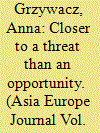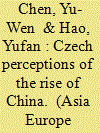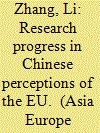|
|
|
Sort Order |
|
|
|
Items / Page
|
|
|
|
|
|
|
| Srl | Item |
| 1 |
ID:
170518


|
|
|
|
|
| Summary/Abstract |
EU politics have experienced vast changes since 2014 from the rise of anti-globalization populist right parties to Brexit. Similarly, populist and nationalist sentiments also appeared in some Southeast Asian democracies such as Taiwan and the Philippines. Despite their national and regional differences, one common characteristic of these developments was that it was those left-behind and economically disadvantaged voters who delivered such results. Trade protectionism and populist nationalism were their answers to ever-growing economic inequality. The growing economic inequality thus has become a common policy challenge to both European and Asian leadership. While political and business elites appealed to inclusive capitalism to address the economic inequality, no holistic, realistic policy combination was ever proposed. This paper is an attempt to translate inclusive capitalism from aspiration to systematic policy actions by employing an Inclusive Development Index (IDI) to the study of an indicative country—Denmark. It was found that those areas which Denmark has been performing well in were areas surrounding acquired equal opportunities: quality public education, health and active labor market policies for developing personal capability from childhood to adulthood, and uncorrupted public services and business-friendly legal and tax regimes for facilitating market competition from business creation to operation, especially for small businesses. Governance was a key to the functioning of this self-producing policy ecosystem, centrally staged as a big investor and enabler for both labor and capital. The distinctive thinking underpinning policy-making—treating economic policies as social policies and vice versa—reconciled economic growth and distributive justice simultaneously, resulting in inclusive capitalism in day-to-day realities. The Danish formula has shown that it was not capitalism that needed to reform, it was the prevailing liberalist orthodoxy that guided governance that was in desperate need of an overhaul.
|
|
|
|
|
|
|
|
|
|
|
|
|
|
|
|
| 2 |
ID:
170520


|
|
|
|
|
| Summary/Abstract |
Chinese initiatives of a geopolitical nature are being more and more frequently analyzed in the literature. At the same time, it is pointed out that at least since 2012 China has been pursuing an assertive and active foreign policy. Due to the importance of the Belt and Road Initiative project and also the 16 + 1 cooperation in the Central and Eastern Europe region, it is worth analyzing what the perception of China in this region is on the example of Poland. The study attempts to answer the question of how the increase in China’s importance and its international engagement are perceived in Poland. The analysis of Polish papers published in 2003–2017 shows, and this is an argument, that Polish researchers more frequently present China in the categories of a threat and apply research terminology and tools within the realistic theory of international relations and this image is being reinforced, especially after 2013. The analytical framework of “China as a threat” and “China as an opportunity” occurring frequently in research is placed in this paper in theories of international relations.
|
|
|
|
|
|
|
|
|
|
|
|
|
|
|
|
| 3 |
ID:
170519


|
|
|
|
|
| Summary/Abstract |
China has increased its investment and influence in Central-Eastern European (CEE) countries through the “16 + 1” framework in 2011 and the One Belt One Road (OBOR) initiatives in 2013. Given China’s rising influence, this paper explores civilian views of China in the Czech Republic. Using survey analysis of 663 respondents in 11 Czech universities, we find that our respondents’ impression of China is neither negative nor positive. By contrast, they do not have a good impression of Russia. Their impression of Japan is the best. Our respondents recognize that China is the most influential player in Asia. Albeit divided, there is a tendency for respondents to believe that China will surpass the USA as the world’s leading power, but they cannot reach consensus on whether such development will be peaceful or not. Our survey also finds out that, while the Czech government wishes to get closer to China politically and economically, citizens are somewhat divided on various dimensions of issues concerning China. This is a pattern that continues from the past. The 2013 change of political landscape in the Czech Republic does not seem to have altered many of the societal responses to China.
|
|
|
|
|
|
|
|
|
|
|
|
|
|
|
|
| 4 |
ID:
170514


|
|
|
|
|
| Summary/Abstract |
The European Commission has emphatically declared that the EU is committed to harnessing globalization by promoting a normative approach to trade. Based on the case study of the ongoing negotiations for a Comprehensive Economic Partnership Agreement (CEPA) with Indonesia, this paper scrutinizes the external conditions for the effectiveness of the European Union (EU) as a norm promoter. Despite the preference of the government to conclude the deal, so far, Indonesia has avoided taking a position on EU-sponsored norms concerning an investment court system and biofuel sustainability standards. This paper explains such a cautious attitude from an international political economy perspective. The proliferation of trade agreements concluded by the EU in the Association of South East Asian Nations (ASEAN) has mobilized the umbrella organization representing Indonesian exporter firms, which has a preferential status as interlocutor of the trade ministry, in support for the European proposals. At the same time, the low degree of trade dependency of the country has empowered Indonesian firms that enjoy the benefits of the large domestic market and, therefore, are in favor of the status quo. Indonesian civil society organizations are also divided on the opportunities and risks associated to the European normative approach to trade. This case study shows how the attempt of the EU to emerge as a normative power through trade has to face the complex political economy incentives and constraints shaping the trade policy of its negotiating partners.
|
|
|
|
|
|
|
|
|
|
|
|
|
|
|
|
| 5 |
ID:
170517


|
|
|
|
|
| Summary/Abstract |
Discussions of the roles of emerging powers in a changing world have been simmering for many years, with many arguing that non-Western powers should build an alternative global order given the growing influence of their money, natural resources, manpower, and products. Focusing on Russia and China, this article argues that both Russia’s energy diplomacy and China’s One Belt One Road policy are mostly ‘mercantile’ in handling their respective domestic challenges over the short and medium terms and do not help build political leadership. The economic structures of the two strongest emerging powers do not support strategies that require the disbursement of economic resources to build an alternative global order—if these two countries truly have such a strategy. This article challenges the myth of emerging powers and suggests that the economic strength of these emerging powers is insufficient to radically shift the diplomatic status quo of a Western-dominated world order.
|
|
|
|
|
|
|
|
|
|
|
|
|
|
|
|
| 6 |
ID:
170516


|
|
|
|
|
| Summary/Abstract |
This paper analyzes the banking systems of the founding states of the Eurasian Economic Union (EAEU) to indentify discrepancies that may hinder the establishment of a single market for financial services. Practical contributions are derived from two dimensions. First, a comparison of the EAEU banking sectors’ structures prior to integration reveals common features such as high concentration, low level of foreign ownership and dominance of state-controlled banks. Significant heterogeneity in the development of the EAEU banking sectors, however, is observed. We expect changes towards reinforced Russian banks’ power in smaller EAEU member states. Intense cross-border competition will drive a further consolidation of domestic credit institutions and decrease the market share of state banks. Second, harmonization of banking regulations and supervisory practices is a critical starting point for moving to a single market for financial services. We report some divergences in the implementation of Basel III standards at the national levels. Russian banks’ regulatory framework is more advanced and compliant with international requirements for capitalization and liquidity. Governance and information disclosure in the EAEU banking sectors, however, remain weak. Unless regulation is strengthened and appropriate prudential tools to control bank risks are properly set, financial integration may facilitate spillover of risks across national borders and threaten the financial stability in the EAEU.
|
|
|
|
|
|
|
|
|
|
|
|
|
|
|
|
| 7 |
ID:
170512


|
|
|
|
|
| Summary/Abstract |
With the increasing importance of the EU, China and the strategic partnership of these two in international politics, scholars and politicians have increased their interest in learning how the EU has been represented and viewed in China. Understanding Chinese perceptions of the EU contributes to better mutual understanding and is important for further developing a positive bilateral relationship. From 2005, when the first scientific study on this topic was conducted; to 2017, over a dozen projects, many fully or partly funded by the European Commission, have been undertaken by European and Chinese scholars. This paper reviews the state of play in the research on how the Chinese media represent and how China perceives the EU. It compares and synthesises the studies and their findings. It argues that the studies and projects have made important scholarly contributions to academic debate and been helpful in providing policy recommendations. However, although their findings do not contradict one another, they are not consistent either. It makes the comparison to track perceptual changes difficult. A methodological reflection on perception studies is discussed, closing with recommendations for future research areas.
|
|
|
|
|
|
|
|
|
|
|
|
|
|
|
|
| 8 |
ID:
170513


|
|
|
|
|
| Summary/Abstract |
The recent proliferation of free-trade agreements drew the attention of the general public to their socio-economic effects on the local community. A common misunderstanding among the general public and firms is that, when an FTA is signed by their domestic government with a partner, the goods produced by their domestic firms will benefit automatically from preferential access to the partner’s market. However, this is not the case. This is where the rules of origin come into play. After reviewing the concept of the rules of origin, we will investigate them in the context of the EU–Japan relations, drawing on three cases: (i) the decision of Japanese firms to invest in Europe in the 1980s, (ii) the rules of origin in the EU–Japan Economic Partnership Agreement, and (iii) how the rules of origin between the UK and the EU following BREXIT could affect Japanese investment in Europe.
|
|
|
|
|
|
|
|
|
|
|
|
|
|
|
|
| 9 |
ID:
170515


|
|
|
|
|
| Summary/Abstract |
This study examines the level of application of Japanese-style management to the Czech Republic from the perspective of hybridization, by employing a survey of Japanese manufacturing firms based in this country. The survey reveals that the Japanese system of production control is strictly enforced, while work organization, labour relations and group consciousness have been—despite targeted practices used by Japanese companies to facilitate application of the Japanese system—largely adapted to the local conditions. Furthermore, this study identifies the transitional process from relying upon Japanese expatriates towards engaging local human resources in the parent-subsidiary relationship. In addition, even though the Japanese-style procurement method is applied with a large number of local suppliers, the local content ratio nevertheless remains relatively low in the Czech Republic. Overall, Japanese manufacturing firms, via their vigorous effort to transfer their distinctive management style, are challenging European business practices and Czech socio-cultural traditions, even though the level of hybridization is strongly variegated according to particular management spheres.
|
|
|
|
|
|
|
|
|
|
|
|
|
|
|
|
| 10 |
ID:
170511


|
|
|
|
|
| Summary/Abstract |
The main purpose of this article is to critically examine the EU’s policies toward North Korea’s weapons of mass destruction (WMD) programs. By analyzing the EU’s approach to North Korea’s nuclear and ballistic missile programs, this article contributes to the debate about what kind of an actor the EU really is—i.e., whether it is a military power, a civilian power, or a normative power—in the security arena of world politics. As an autocratic regime with fundamental problems in relation to the proliferation of WMD and human rights, North Korea presents a good test case for considering the contested concept of EU’s international identity. The central thesis explored in the present article is that the EU is, strictly speaking, neither a military, nor a civilian, nor a normative power. That said, the EU’s international identity is closest to the concept of a global civilian power.
|
|
|
|
|
|
|
|
|
|
|
|
|
|
|
|
|
|
|
|
|